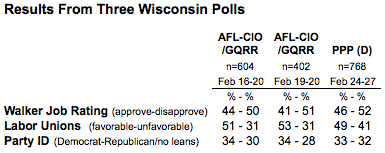
WASHINGTON -- A automated telephone poll conducted this week in Wisconsin by the Democratic-affiliated firm Public Policy Polling (PPP) largely confirms other recent polls showing public support for collective bargaining rights for unions and, by a narrow margin, more opposition than support for the agenda of Gov. Scott Walker (R). Some caution is in order, however, about several vote preference questions included in the same survey.
Despite the ongoing coverage and national interest in the controversy, all of the opinion surveys taken within Wisconsin so far have had sponsors with partisan ties, and each has taken a different approach to the questions asked. Where their questions have been similar, however, we can begin to compare the results.
Near the beginning of their survey, for example, PPP asked whether "public employees in Wisconsin should or should not have a right to collective bargaining for wages, benefits, and working environment rules?" The result: 57 percent say Wisconsin's workers should have collective bargaining rights, 37 percent say the should not and 7 percent are unsure.
Compare that result to the question asked on another automated survey conducted last week in Wisconsin by the Franklin Center, a conservative organization that, according to Talking Points Memo, was founded by a former Republican operative: "Should Wisconsin's state employees and public employee unions have collective bargaining powers?" Despite different wording and placement later in the questionnaire, the survey produced a very similar result: 56 percent said Wisconsin public workers should have collective bargaining, 32 percent said they should not and 12 percent were uncertain.
Finally, consider the poll sponsored by the AFL-CIO and conducted by the Democratic polling firm Greenberg, Quinlan, Rosner Research. They tested a series of proposals introduced as "supported by Governor Scott Walker and Republican leaders in the state legislature" including a plan to "eliminate collective bargaining for public employees." Again, they obtained a similar result: 52 percent oppose eliminating collective bargaining, 31 percent support it and 11 percent are uncertain.
So all three surveys produce roughly comparable results on this questions, finding support for collective bargaining in the mid-to-low 50s and opposition in the mid-to-low 30s.
Both the PPP and AFL-CIO surveys also asked similarly worded job approval rating of Gov. Walker and a favorable rating of labor unions. Their ratings of Walker were similar -- all were within the margin of error of an average of 44 percent approve, 51 percent disapprove. Both also found net positive favorable ratings of labor unions generally, although in a pattern that matches what we typically see in sponsored pre-election polling, the AFL-CIO poll produced a slightly more positive rating for labor unions. Their results for party identification (without "leans") are also very close.

As such, PPP's characterization of their data is appropriate: Wisconsin does appear "very closely divided, but it leans slightly to the union side of things rather than Scott Walker's on pretty much every question we asked."
That said, PPP's tests of a potential recall vote against Walker and a hypothetical "do over" vote of the 2010 election should give us some pause. They found as many voters supporting a recall of Walker as opposing it (48 percent each), and found Walker trailing his 2010 Democratic opponent Tom Barrett by a seven-point margin (45 percent to 52 percent) after asking respondents how they would vote if given the chance to "do last fall's election for Governor over again."
The problem is that they asked those questions immediately after five items about the conflict between Walker and the public unions. While those questions are generally neutral and lack the "problematic" factual basis of some of the questions on the Rasmussen Reports survey we challenged last week, PPP's approach creates a very specific and potentially artificial context for the horse-race questions that follow. It is entirely about the conflict between the governor and the public unions, with an emphasis on the battle over collective bargaining rights.
Admittedly, any "order effect" here would likely be small. Note that Rasmussen conducted a follow-up to their controversial national survey that altered (and improved) the question order. The second survey narrowed the reported margin of agreement with Gov. Walker, but only by four percentage points.
But when vote preferences are relatively close -- as they are for a potential recall question or even for the Walker-Barrett recall -- small differences matter more. Understanding how Wisconsin voters feel about individual issues is important, but any vote choice will ultimately reflect a host of different judgements. Priming just one issue or one set of questions before asking a vote questions may nudge some respondents in the wrong direction.
In a separate release earlier this week, PPP also reported that the apparent shift between how Wisconsin voted this past November and how they would vote now in a hypothetical Walker-Barrett rematch "can almost all be attributed to shifts within union households." But note that the shifts they report are based on another question from the same survey that asked respondents to recall how they voted in November. That retrospective question produces a retrospective tie (47 percent for each candidate), but Walker actually defeated Barrett by a seven-point margin (52 percent to 46 percent). That's an odd result given that election winners typically to do better on retrospective questions. Here Walker does worse, although the pattern can reverse for winners whose popularity plummets.
The Wisconsin exit poll from last November adds another complication. It found fewer self-reported union members among those who cast ballots (26 percent vs. the 32 percent reported by PPP) and different vote reports among union members. The PPP poll, for example, shows Barrett's margin over Walker among union members growing from 14 point on the retrospective question (54 percent to 40 percent) to 31 points now (64 percent to 33 percent). But according to the network exit poll, Barrett won by a 26-point margin among union members (63 percent to 37 percent).
